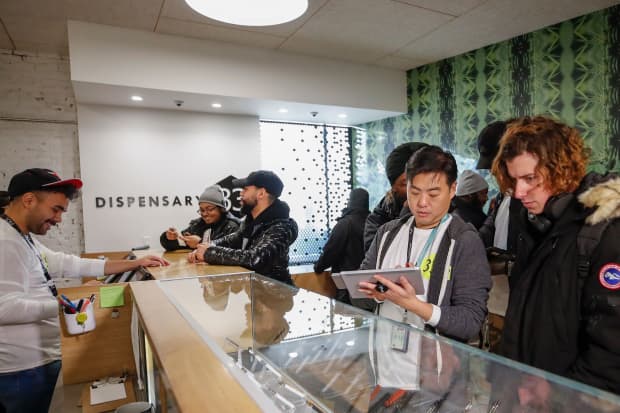# One-third of Americans could soon have access to legal pot as New Jersey, Arizona decriminalize cannabis

Table of Contents
“#
One-third of Americans could soon have access to legal pot as New Jersey, Arizona decriminalize cannabis
”
More than 100 million Americans will soon have access to recreational marijuana sales in their home states, after two largest states with 2020 election measures vote to approve

Recreational marijuana sales began in Chicago on Jan. 1, and five states were voting Tuesday on decriminalizing the drug.
AFP/Getty Images
After Election Day 2020, one-third of Americans could live in states with legalized recreational cannabis sales.
Arizona and New Jersey voted to approve recreational-marijuana sales Tuesday, The Associated Press projected at 11 p.m. Eastern, after polls closed in Arizona. That adds to 11 states that have allowed recreational sales of the drug since Colorado and Washington broke the seal in 2012, and means that a full third of the American population lives in states that have legalized recreational cannabis sales, according to census figures.
See also: In states where marijuana is legal, licensed dispensaries are pushing out drug dealers
New Jersey voters were approving marijuana legalization by a better than 2-to-1 margin Tuesday evening with 59% of precincts reporting.
“We anticipated an influx of negative publicity and press trying to block the vote [in New Jersey], none of that happened,” said Rob DiPisa, co-chairman of the Cannabis Law Group at law firm Cole Schotz.
“New Jersey will be a big deal because it will be the first mid-Atlantic state to legalize cannabis for adult use. It’s also between Pennsylvania and New York, two states that have been discussing legalization for some time,” DiPisa said. “New Jersey will influence those neighboring states and usher them over the edge, especially because COVID-19 has created big budget deficits.”
Arizona’s second attempt to legalize marijuana had 60% of the vote with 15% of precincts reporting, and Montana had a similar split with 28% reporting. South Dakota was the closest race in early returns, with a measure to legalize recreational marijuana running 52% to the pro side with 67% of precincts reporting. South Dakotans also voted on legalizing medicinal marijuana concurrently, and that proposal was winning easily with 69% of the vote. Mississippi voted on legalizing medicinal marijuana, which is legal in at least 33 states; the measure was receiving 2-to-1 support with 16% of precincts reporting Tuesday evening.
The national election also could have an effect on cannabis-legalization efforts. Former Vice President Joe Biden and his Democratic running mate, Sen Kamala Harris, have voiced support for decriminalizing marijuana on a federal level. Incumbent President Donald Trump has previously voiced support for decriminalizing marijuana but has not openly endorsed Democratic pushes in Congress for pro-marijuana initiatives such as the SAFE Banking Act, which could only grow if the Senate flips.
Opinion: Here’s what the numbers show about the impact of legal marijuana
“Arguably, just as important to continued cannabis reform as who occupies the White House is which party controls the Senate,” Canaccord Genuity analyst Bobby Burleson wrote in a note on the elections. “With a Democratic-controlled House of Representatives that has been making significant strides as of late in drafting new cannabis-related bills, the Senate has been the major roadblock to virtually all of these initiatives’ ability to become law.”
The largest American cannabis businesses are known as multistate operators, or MSOs, maintaining marijuana businesses in several states despite the continuing federal prohibition on the drug. They are not allowed to list on the major stock exchanges in the U.S. because the business is federally illegal, so many have fled to a small Canadian exchange and list their shares over-the-counter in the U.S.
Some of the MSOs are already operating in states where medical marijuana is legal, including New Jersey and Arizona. Burleson pointed out that Curaleaf Holdings Inc.
CURLF,
is the No. 1 operator in New Jersey and No. 2 in Arizona, behind Harvest Health & Recreation Inc.
HRVSF,
which also has many stores in Pennsylvania’s medical market, which the analyst believes could turn to recreational operations soon.
For more: Which cannabis companies are going to survive coronavirus? Here’s how to tell
“MSOs are well-suited to survive as the market in these new states come online and get more saturated. … It’s those who perfected the craft and can operate lean that will survive,” DiPisa said.
“This is not the industry of five years ago,” he said. “It moves in dog years.”
The legalization of marijuana in Canada in late 2018 as well as large states such as California led to a boom in investment in marijuana companies, but the companies and their stocks have struggled greatly amid shifting regulations, high tax rates and continuing black-market sales.
Much of the remaining investment in the space is betting on the U.S. opening up, with large public Canadian companies such as Canopy Growth Corp.
CGC,
WEED,
and Aurora Cannabis Inc.
ACB,
ACB,
— which can list on the major U.S. exchanges because recreational pot is legal in Canada — acquiring warrants to own MSOs and other U.S.-focused businesses if the sale of recreational marijuana becomes federally legal.
Burleson pointed out that Biden voiced support for reclassifying marijuana in the Controlled Substances Act and making medicinal marijuana federally legal could end punitive taxes on pot companies and bring their effective tax rates down from more than 50% to closer to 21% of net income.
By
Jeremy C. Owens,
and
Ciara Linnane
For forums sites go to Forum.BuradaBiliyorum.Com
If you want to read more News articles, you can visit our News category.



